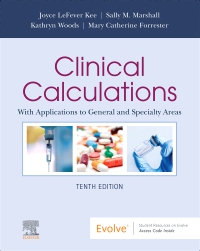
Clinical Calculations - Elsevier eBook on VitalSource, 10th Edition
Elsevier eBook on VitalSource

Help your students learn the common methods of drug calculation, and use the method that is right for them! Clinical Calculations: With Applications to General and Specialty Areas, 10th Edition makes it easy to learn to calculate drug dosages accurately. It covers four major drug calculation methods — basic formula, ratio and proportion, fractional equation, and dimensional analysis — plus body weight and body surface area. It also includes practice problems not only for general care but also for specialty areas such as pediatrics and critical care. Now preparing students for the Next-Generation NCLEX® examination, this market-leading text shows how drug calculation and drug administration are related and emphasizes patient safety above all else.
-
- NEW! Next-Generation NCLEX® examination-style and NGN Prep questions introduce students to new elements from the updated NCLEX exam, assessing critical thinking, clinical judgment, and decision-making based on actual clinical situations
- NEW! Next-Generation NCLEX case studies on the Evolve website allow instructors to assign these as supplemental testing or extra NGN preparation
- Coverage of four major drug calculation methods includes basic formula, ratio and proportion, fractional equation, and dimensional analysis, as well as body weight and body surface area, enabling students to learn and apply the method that works best for them
- Information on drugs, drug administration techniques, and devices covers the most up-to-date techniques of drug administration, including oral, intravenous, intra-muscular, subcutaneous, and other routes
- Calculations for Specialty Areas section addresses the drug calculations needed to practice in pediatric, labor and delivery, critical care, and community settings
- Detailed, full-color photos and illustrations show current equipment for IV therapy, the latest types of pumps, and the newest syringes
- Practice problems are included for specialty units — pediatrics, critical care, pediatric critical care, labor and delivery, and community — in addition to general patient areas
- Comprehensive post-test allows students to test their knowledge of key concepts from the text
- Information on pumps covers insulin and enteral infusion pumps, plus intravenous infusion pumps such as single and multi-channel, PCA, ands syringe, explaining their use in drug administration
- Caution boxes provide alerts to problems or issues related to various drugs and their administration
-
- NEW! Next-Generation NCLEX® examination-style and NGN Prep questions introduce the new elements from the updated NCLEX exam, assessing critical thinking, clinical judgment, and decision-making based on actual clinical situations
-
Part I: Basic Math Review
Part II: Systems, Conversion, and Methods of Drug Calculation
1. Systems Used for Drug Administration
2. Conversion Within the Metric, Apothecary, and Household Systems
3. Interpretation of Drug Labels, Drug Orders, Bar Codes, MAR and eMAR, Automation of Medication Dispensing, and Abbreviations
4. Prevention of Medication Errors
5. Alternative Methods for Drug Administration
6. Methods of Calculation
7. Methods of Calculation for Individualized Drug Dosing
Part III: Calculations of Oral, Injectable, and Intravenous Drugs
8. Oral and Enteral Preparations with Clinical Applications
9. Injectable Preparations with Clinical Applications
10. Insulin Administration (NEW!)
11. Intravenous Preparations with Clinical Applications
Part IV: Calculations for Specialty Areas
12. Pediatrics
13. Critical Care
14. Pediatric Critical Care
15. Labor and Delivery
16. Community
Part V: Post-Test: Oral Preparations, Injectables, Intravenous, and Pediatrics
Appendix A: Guidelines for Administration
Appendix B: Nomograms: Child and Adult




 as described in our
as described in our 